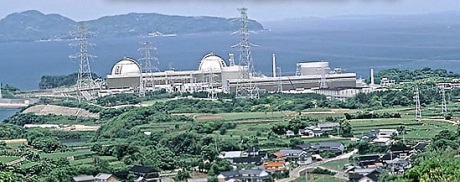Kyushu Electric Power Company today began the process of restarting operation of unit 3 at its Genkai nuclear power plant in Japan's Saga prefecture. The reactor is scheduled to resume commercial operation next month.

The four-unit Genkai plant (Image: Kyushu)
The utility said the process of extracting the control rods from the 1180 MWe pressurised water reactor (PWR) was restarted at 11.00am today. Kyushu said it plans to resume electricity generation at Genkai 3 on 25 March but noted that this date could change "due to turbine adjustment, etc."
"After restarting generating electricity, we will conduct the adjustment operation as output is gradually increased," Kyushu said. "Accordingly, the plant is expected to undergo the integrated performance test and return to commercial operation in late April."
Kyushu submitted applications to Japan's Nuclear Regulation Authority (NRA) in July 2013 to restart Genkai 3 and 4, which have been offline since December 2010 and December 2011, respectively. In January 2017, the NRA confirmed the two 1180 MWe PWRs meet new regulatory standards.
The Saga prefectural governor gave his approval in April for the restart of the units, following the prefectural assembly's adoption of a resolution permitting their restart.
Following NRA pre-operation inspections of the units to confirm that the safety countermeasure equipment complies with the approved construction plan at the Genkai plant, Kyushu began loading fuel into the core of Genkai 3 on 16 February.
Genkai 3 is the seventh of Japan's 42 operable reactors which have so far cleared inspections confirming they meet the new regulatory safety standards and resumed operation. The others are: Kyushu's Sendai units 1 and 2; Shikoku's Ikata unit 3; and Kansai's Takahama units 3 and 4 and Ohi unit 3. Another 17 reactors have applied to restart.
Kansai expects to refuel Ohi unit 4 in mid-April and restart it around mid-May, with commercial operation expected to resume in early June. Kyushu also plans to reactivate Genkai unit 4 in May.
Nuclear energy is expected to account for 20-22% of Japan's power generation in 2030, with a similar portion coming from renewable sources. The remainder of the country's power generation will be met by coal (26%), LNG (27%) and oil (3%), according to Japan's latest energy policy. That policy supports "utilising nuclear power generation whose safety is confirmed".